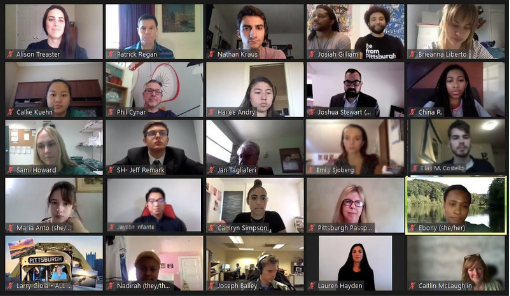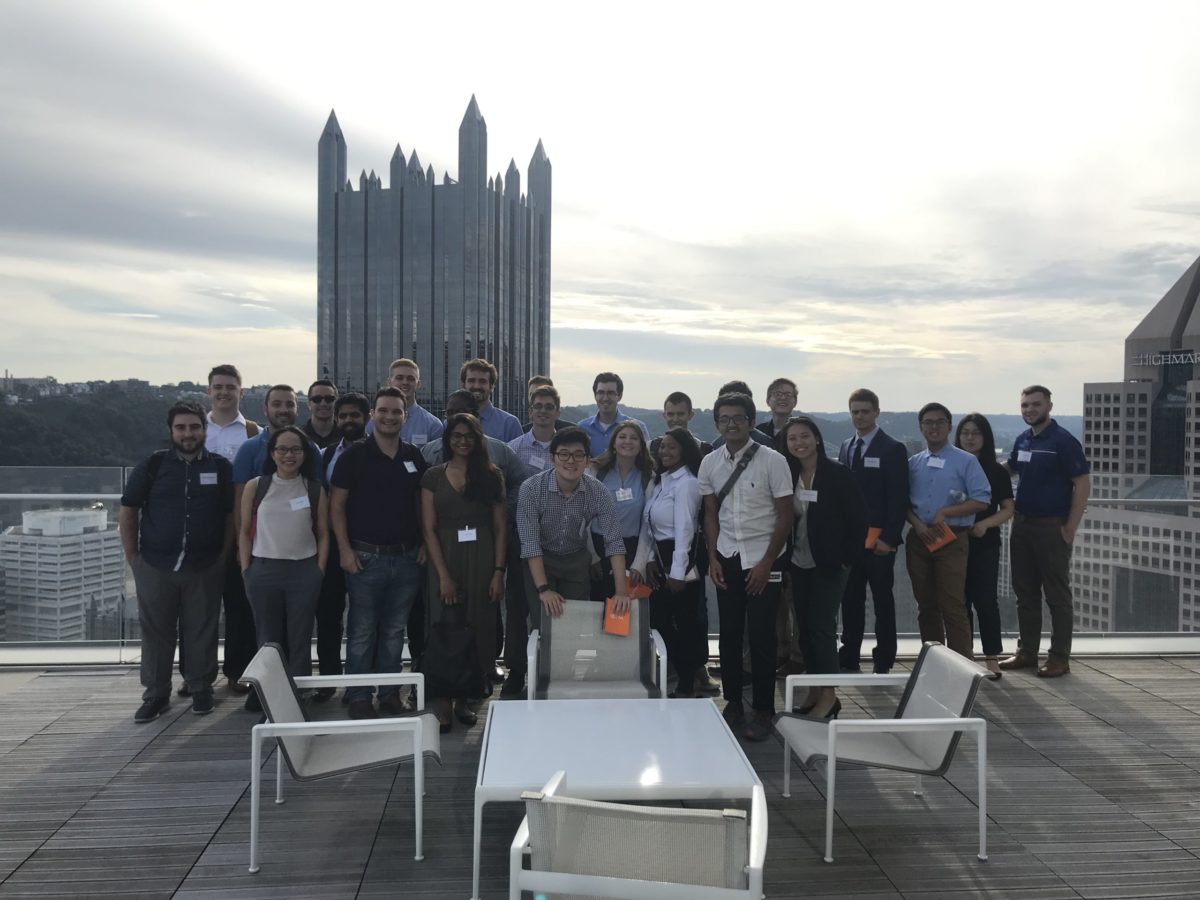Pittsburgh wants to reverse its post-industrial population exodus.
Since the mid-twentieth century, the city’s population has steadily declined, and with it, the talent pool for local jobs. Though that decline has somewhat stagnated in the past decade, the city still struggles to meet increasing hiring demands from the tech industry. Worse yet, a 2016 report from Bloomberg’s CityLab showed that Pittsburgh retained only 50% of graduates from local two- and four-year institutions, indicating that a good chunk of students coming to the city for education go on to leave once they have that new talent.
These problems are among those that the Pittsburgh Passport program aims to solve.
“The program started in 2019, really, as a way for us to ensure that we were retaining the 40,000 college students who were graduating here each year,” said Alison Treaster, the senior director for talent at the Allegheny Conference on Community Development, which runs the Pittsburgh Passport program. “After doing focus groups and surveys, we really found students didn’t have an idea of what opportunities were here from an employment perspective.”
To bring that awareness to students and young professionals in the city, the Pittsburgh Passport program hosts a series of community events throughout the summer, from kayaking trips to local company information and recruiting sessions. The idea is to connect participants directly with potential employers in a casual way, while also showing them cultural aspects of the city they can turn to after the workday ends, Treaster said. Recent participating employers include Argo AI, PNC Bank and Bosch.
The program launched in the summer of 2019 as a pilot for interns working at Pittsburgh companies, with all of the activities and events happening in person. But, like everything else in 2020, the program went fully online for the following summer, and Treaster thinks that actually turned out to be a good thing.
“There’s basically no cost barrier to virtual [programming] to open it up to any students, any recent graduates, whether or not they had an internship in the region,” she said.
In doing that, the program attracted participants from 39 states and 41 countries to its events. This summer will include a mixture of online and outdoor in-person events.

Pittsburgh Passport has a mix of events for young professionals, including kayaking. (Courtesy photo)
Because the program is still relatively new, Treaster said there isn’t a ton of data yet on how the program is actually impacting retention and attraction of young talent to Pittsburgh. Widespread layoffs and hiring freezes during the 2020 recession could also skew the data. Still, “we do know that in 2019 to 2020 that the offer to hire ratio increased for internships to full-time opportunities, and the Passport was the only common denominator that changed year over year,” she said.
Jeff Remark, an intern at Northwestern Mutual this summer and marketing major at Robert Morris University, learned about companies he didn’t previously know existed in Pittsburgh through the program. One of his favorite events was an online session with Astrobotic, a North Side-based aerospace company building autonomous rovers and navigation systems for launch to the moon.
“If you would have told me that a company is doing the things that they’re up to in Pittsburgh, I would have probably laughed to be honest,” said Remark. “I never thought that that was a thing in Pittsburgh.”
But Pittsburgh’s talent recruitment and retention issues go beyond increasing awareness of opportunities at local companies. Data from the American Community Survey, a demographics program operated by the United States Census Bureau, showed that between the 2008-2013 and 2014-2018 time periods, the Black population in the City of Pittsburgh decreased by almost 10%.
One solution that Pittsburgh Passport sees to this problem is leveraging the diversity of the student and young professional population, and bringing more equity to local recruitment and hiring processes for that age group.
“I actually think [Pittsburgh Passport] is a fantastic opportunity for employers to connect with diverse talent,” Treaster said. “Of over 1700 students last year [in the program], 46% identified as students of color, and so the most diverse demographic we have in Pittsburgh is the college students.”

Pittsburgh Passport events went virutal in 2020. (Courtesy photo)
While the program supports participants across a wide range of industries, Treaster mentioned that the fast-growing tech scene in Pittsburgh brings an added motivation to increase equity in access to those jobs. Many of the Pittsburgh Passport company events involve networking with current employees at those companies. But a shortcoming of that, Treaster said, is that “less than 4%, of technical workforce in Pittsburgh is Black. And so it’s not like you’re likely to have a lot of people in your network to plug into and to ask questions.”
One way the program looks to resolve this is through collaborating with organizations already doing grassroots work to promote local equity in tech employment. Specifically, Treaster mentioned coding bootcamps Academy PGH and the local chapter of General Assembly as two examples of technical training pathways with a focus on equity.
“They’re really working at a community level to make sure that people understand where the opportunities are, and helping with any other barriers they may have in terms of transportation, childcare… to make sure that they can have training opportunities accessible to them,” she said. And over time, as people from these bootcamps and other organizations launch their new tech careers in Pittsburgh, “we can start to kind of build this ecosystem of a more diverse workforce from the local community.”
Plenty of Pittsburgh Passport events are scheduled for the rest of the summer. Those interested can register here.
Sophie Burkholder is a 2021-2022 corps member for Report for America, an initiative of The Groundtruth Project that pairs young journalists with local newsrooms. This position is supported by the Heinz Endowments.Join the conversation!
Find news, events, jobs and people who share your interests on Technical.ly's open community Slack

Pittsburgh weekly roundup: 412 Food Rescue's new CEO; Inside Diversitech; Fentanyl sensor innovations

The Affordable Connectivity Program just ended. What’s next for the 763,000 Pennsylvanians who depended on it?

This Week in Jobs: Tech week takes over with a job fair with 8 hiring companies and 18 different conference sessions


